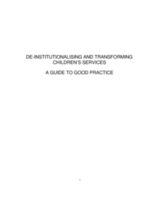This briefing document outlines three major projects conducted under the auspices of the European Commission's Daphne Programme. These projects included:
- A survey of 33 European countries, designed to map the number and characteristics of children less than 3 years old in institutional care for more than three months without a parent. There were 23,099 young children (11 per 10,000) in institutional care across the survey area. Four countries had less than one per 10,000 young children in institutions; alarmingly, eight countries had between 31 and 60 children per 10,000 in institutions.
- A study of 7 European countries (Denmark, France, Greece, Hungary, Poland, Romania and Slovakia) to identify the ways in which young children in institutional care were being de-institutionalised and returned to family-based care. Approximately 20% of children returned to their parents or relatives, 63% entered a new family (foster care or adoption) and 25% were moved to another institution (of 11 children or more). Countries with better community support services were more likely to base their decisions on the child’s needs and to provide better preparation for the move. Most countries assessed children’s physical, health and developmental needs together with the physical environment and carer suitability; however, only half of the disabled children had their disability assessed as part of the decision-making process and only 38% of children with siblings were placed with one of their siblings.
- The development of a training and information pack in order to disseminate the findings and good practices identified from the previous work. The The training aims to prevent the placement of all children under five years (whether disabled or not) in residential institutions through the implementation of a Ten Step Model (included in this document and supporting links).
The results of these projects are presented in the context of existing data on the effects of institutional care and a series of rights-based best practices for children in need of protection and care.
©Centre for Forensic and Family Psychology, University of Birmingham

